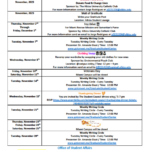By: Rita M. Rivera – AU PsyD Student, Student Learning Assistant – Title V Student Success
Coronavirus is a health issue that is being taken very seriously by public health authorities worldwide, as well as our campus’ administrators and faculty members.
As the current situation continues to unfold, there can be a wide range of thoughts, feelings, and reactions regarding Coronavirus and its impact on communities.
It is important for you to identify reactions you may be experiencing, as well as to learn and practice ways to manage stress and anxiety. Below is some helpful information and resources.
Common Reactions
During the following next days or weeks, you may experience a wide range of reactions and emotions. These can be common behavioral, physical, and emotional signs of stress. These may include periods of anxiety, worry, guilt, or anger. You could also feel helpless, out of control, or socially withdrawn from others. You may experience difficulty communicating or concentrating, as well as have trouble relaxing or sleeping.
The current situation is constantly changing and you may have to face many transitions, such as studying or working from home. All of the ongoing changes may affect your usual routine and schedule, and most importantly, your mental health. Therefore, it is important for you to recognize and target these early warning signs of stress and anxiety.
There are many simple and effective techniques you can follow to manage stress regarding Coronavirus. The following strategies can also help you improve overall emotional and physical well-being.
Strategies to Manage Stress & Anxiety

- Get the facts. It is very important for you to stay informed with the latest health information. However, make sure you are getting information from reliable sources. This ensures that you are getting accurate data and facts.Examples of trustworthy sources include the official websites for the Centers for Disease Control and Prevention (https://www.cdc.gov/), the World Health Organization (https://www.who.int/) and your state’s department of health (for Florida’s go to: http://www.floridahealth.gov/). Remember to also check your Sunmail account and the Albizu’s social media for official updates from the institution.
- Take breaks from the media. Try to limit the time you spend watching and/or listening to media coverage. It is understandable that you want to keep informed, especially if you have family members, friends, and loved ones in affected regions or countries. However, it is also important for you to take breaks from upsetting news. Focusing on positive things in your life and things you have control over can help ease your anxiety and worries. Don’t know where to start? Try practicing practice mindfulness exercises: https://www.pocketmindfulness.com/6-mindfulness-exercises-you-can-try-today/
- Relax. Try relaxing your body by doing things that work for you, such as taking deep breaths, stretching, meditating, and engaging in pleasurable hobbies. Here are “10 Relaxation Techniques That Zap Stress Fast:”

Now is the perfect time to read books you have always wanted to but never had the time. Need ideas? Here is a link to the Times’ list of 30 books & series to read while social distancing: https://time.com/5807460/books-to-read-coronavirus/.
You can also try listening to podcasts on topics you like, explore museums online, or watch movies remotely with friends using Netflix Party!
- Keep yourself healthy. Try to eat healthy foods and drink water. Get enough sleep and rest. Also, adopting hygienic habits can help you stay healthy by reducing the risk of Coronavirus and other diseases. Make sure to wash your hands with soap and water for at least 20 seconds. You can also use an alcohol-based hand sanitizer to clean your hands. Try to avoid touching your face, specifically your eyes, nose, and mouth. Cover your mouth and nose with a tissue or your sleeve when coughing or sneezing. Most importantly, stay home as much as possible!
- Seek additional help. It is perfectly okay to ask for help. If you are currently facing many challenges or issues, try talking to a loved one about it, such as a family member or a friend. You can read more on “Why Talking about Our Problems Make Us Feel Better” here: https://www.psychologytoday.com/us/blog/your-personal-renaissance/201906/why-talking-about-our-problems-makes-us-feel-better
You can also reach out to your professors and advisors. They are always looking forward to helping and providing you with any resources you may need.
If you are experiencing overwhelming worry or anxiety, consider seeking help and support from a mental health professional. For more mental health information and resources in the State of Florida, you can visit the Florida Network of Care: https://southeast.fl.networkofcare.org/mh/. If you or someone you know is in emotional distress, contact the 24/7 National Suicide Prevention Lifeline: 1-800-273-TALK [8255] or live online chat: https://suicidepreventionlifeline.org/.
Remember that experiencing these feelings are common during and after an event like an infectious disease outbreak, even if the situation does not directly threaten you.
Now is the time to monitor your physical and mental health, practice strategies that help you relieve stress, and stay safe at home! This will soon pass. We got this!
Albizu University’s Office of Student Affairs and Title V staff is here to serve you!









